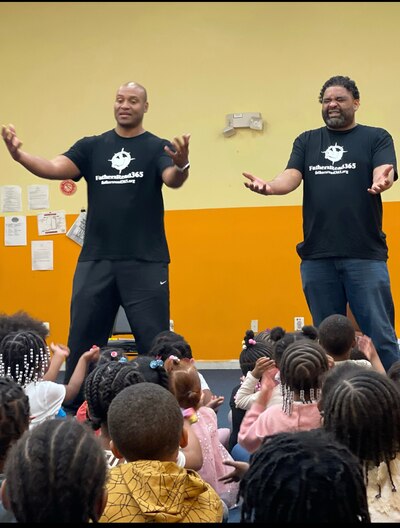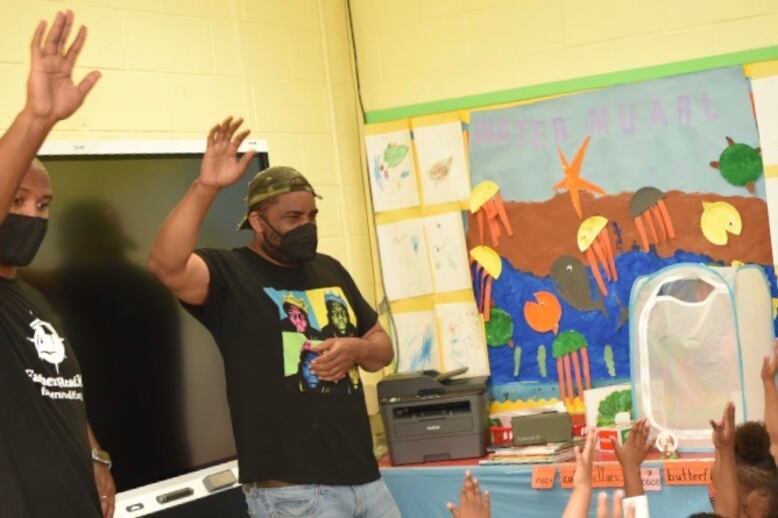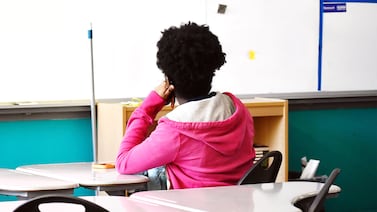Brent Johnstone and Akeiff Staples met at Temple University, where they were both on the football team. Each went on to a career in social work, where they would cross paths from time to time. But as they put it, something else was “meant to be.”
Five years ago, the two started a Philadelphia program to help fathers returning from prison re-engage with their kids through reading. They had seen firsthand how a lack of male role models, combined with frustration stemming from an inability to read, could lead to poverty, violence, substance abuse, and worse.
“You can almost guarantee a positive impact in a child’s life by just reading to your child,” Johnstone told Chalkbeat. “And that’s only at an average of 20 minutes a night.”
Johnstone and Staples decided “to attack early literacy through the vision of fathers engaging” with their kids, Johnstone said. They committed to work full-time for their new venture, FathersRead365, even though they had no funding commitments at the time.
Before long, the project expanded. Staples and Johnstone began holding fun, high-energy reading events for kids in daycare centers, inviting adults — particularly fathers — to join in. FathersRead365 is now in about 150 centers and has received almost $400,000 in funding to date. It’s also given away 100,000 books to Philadelphia schoolchildren.
“One of the main reasons we do this is we just don’t feel like people realize how important children not knowing how to read past a third-grade reading level is, and how that impacts crime and violence,” Johnstone said. A study found that just 33% of Philadelphia third graders were proficient in reading, he noted.
That’s important because “no one’s teaching your kid to read after third grade,” he said. So if children aren’t reading on grade level by then, “there’s a great chance they won’t be on level the rest of their lives.”
When the pandemic hit and in-person events were not an option, the team decided to focus on book distribution. It discovered major discrepancies in the availability of reading materials among kids in different neighborhoods, Johnstone said.

He pointed to a study from 2001 that found there were about 300 children for every book available in a high-poverty section of Philadelphia, while each child in a middle-class neighborhood had access to about 13 age-appropriate books.
That figure gave the two the idea of putting 13 books in a bookbag and distributing the bundles to kids at their schools. FathersRead365 partnered with 14 city schools and the William Penn Foundation to put together and distribute the parcels. This past school year, they gave 13 books and a bookbag to each of roughly 1,000 students.
“When the pandemic set in, our whole model kind of shut down, because we’re interactive, in your face, inviting a ton of people to engage in these activities,” Johnstone said. “It made us pivot, and it’s probably one of the best things that could have happened to us.”
They have also raised money for a “Book Bus” that will travel to schools and distribute books, he said.
A visit from FathersRead365 helped jump-start the “Lions Roar for Reading” program at T.M. Peirce Elementary School, said Assistant Principal Austin Wallace Jr. “Their program fit perfectly with what I was trying to bring to our school in terms of having male representation in the classrooms to expose students to literature,” he told Chalkbeat.
“Young males aren’t exposed to male voices reading to them, or male figures in front of them reading,” Wallace continued. “We wanted to expose the young men to that,” particularly in the lower grades when “foundational skills are solidified,” he said.
Wallace had drafted every male staff member working at Peirce, from principal to custodian, to spend 10 to 15 minutes each Friday reading to a class within the pre-K-3 range. When Staples and Johnstone came in as part of that effort, “that was pretty much what solidified the program as a recurring thing,” Wallace said.
“I look forward to working with FathersRead for as long as they’re willing to work with me,” said Wallace, who in the fall will be principal of Delaplaine McDaniel, a K-8 school, in South Philadelphia.
Johnstone and Staples have plans to expand, though it takes work. They’re building their YouTube channel so kids can remain engaged, and hope to be able to board the “Book Bus” and distribute those gifts of 13 books and a bookbag around the country.
And the art of fundraising, Staples said, is something they’re learning about constantly.
“When it comes to fundraising for Black-led nonprofit organizations, it can be tough,” he said. “You have to run through hoops.”
Staples and Johnstone connected with their group’s first funder, the William Penn Foundation, at a 2018 literacy event. “Akeiff and I were really into our program, with absolutely no funding in sight. We just went up there and were ourselves and had a heck of a time,” Johnstone recalled. A William Penn program officer reached out to them after the event, and “from there, the relationship has grown,” Johnstone said.
Philadelphia School Board member Reginald Streater said efforts like FathersRead365 are much appreciated.
“As we know, often the first teacher or information leader is a child’s parent,” Streater told Chalkbeat. “Parents are already partners,” he said, but “some parents just don’t know how to be the partners that the school district needs.”
Chalkbeat Philadelphia Bureau Chief Johann Calhoun contributed reporting.







